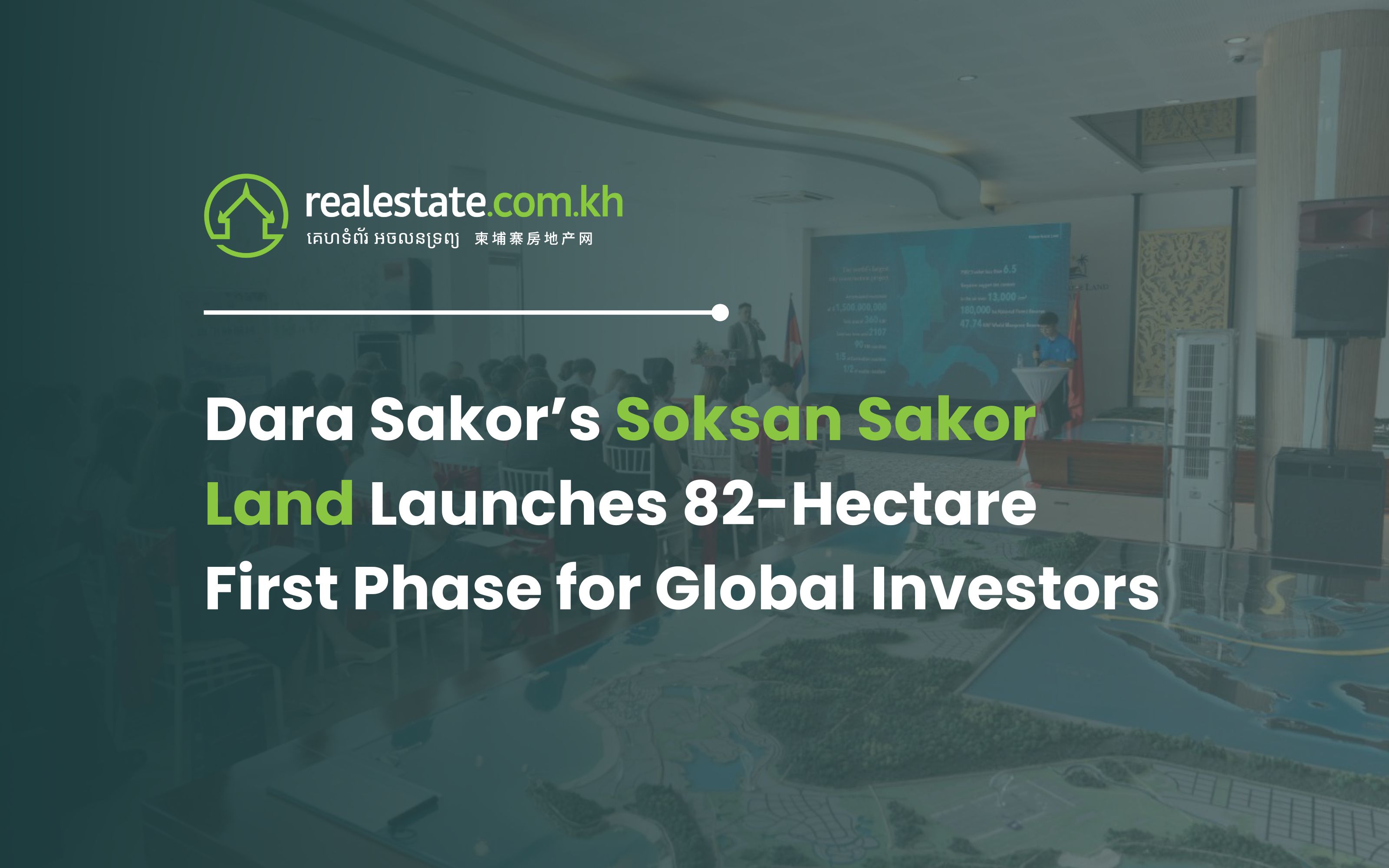
 In Realestate.com.kh's Insider Analysis, real estate market leaders share their outlook on the 2016 Cambodian real estate market.
In Realestate.com.kh's Insider Analysis, real estate market leaders share their outlook on the 2016 Cambodian real estate market.
 Sam Yang, ceo of Eastland Development HK Co. Ltd.
Sam Yang, ceo of Eastland Development HK Co. Ltd.
1) What has been the overriding trend in the Cambodian real estate market of 2016 so far, and what has been the effect of this trend on the current market outlook?
“I'd say the increased interest in landed properties and commercial real estate.
In Cambodia the value of landed properties is largely driven by the increase in land prices. However, it is expected that during the Cambodian elections next year there will be a cooling trend regarding the land market. The price of landed properties is expected to remain relatively stable though they may drop slightly.
As for commercial real estate, I believe the market will remain strong due to the great demand exceeding supply, especially towards the so-called “grade B” offices. Moreover, traditionally foreign enterprises or funds prefer to purchase or invest in projects near completion. As there will be only a few commercial buildings finished next year, I believe that the demand will drive this particular market upward.”
2) In your opinion, what is one facet of the market that is most in need of development right now - and that you believe is crucial for the long term health of the Cambodian real estate market? Why? And how might this be achieved?
“Education of investors is the most crucially needed factor to maintain a healthy market in the long-term. This is because so many non-Cambodians do not have a clear understanding about this country or even Phnom Penh. As for locals, they don’t yet appreciate fully the benefits of living in a condo. I suggest that there is a strong need to increase this country’s exposure to the rest of the world via advertising abroad, introducing the beauty of this country. And that’s something that the government can lead on and coordinate with the private sector in order to achieve success.”
 Ross Wheble, country manager of Knight Frank (Cambodia) Pte Ltd.
Ross Wheble, country manager of Knight Frank (Cambodia) Pte Ltd.
1) What has been the overriding trend in the Cambodian real estate market of 2016 so far, and what has been the effect of this trend on the current market outlook?
“One overriding trend that we have witnessed so far in 2016 is the increasing amount of investment coming from China.
Previously, Chinese investment was mainly focused on infrastructure and construction contracts, but there has now been significant investment by Chinese developers into Cambodia, a lot of which is being invested in Sihanoukville and the hospitality/gaming sector.
Whilst there have been concerns raised regarding the condominium market in Phnom Penh, Cambodia is still an attractive investment destination and Sihanoukville seems to be the next hotspot, which is largely being driven by improving infrastructure.
Sihanoukville represents not only a tourist destination with much potential but also a key economic hub with Cambodia’s only operational deep sea port and several Special Economic Zones, and this will drive demand across all real estate sectors in the province. The medium to long term prospects for Sihanoukville are very promising; this is highlighted by the recent announcement that the five star luxury resort operator, Six Senses, will be operating an island retreat on Koh Krabey, scheduled to open in 2017, in addition to several global hotel chains eyeing up the coastal destination.”
2) In your opinion, what is one facet of the market that is most in need of development right now - and that you believe is crucial for the long term health of the Cambodian real estate market? Why? And how might this be achieved?
“Cambodia’s real estate market is still at a nascent stage of development and teething problems along the way are to be expected. However, a key area of focus for any developing country should be infrastructure. This includes both hard (physical infrastructure; such as roads, railway networks, mass transportation systems, utilities) and soft infrastructure (the education system, healthcare system, financial system) - and it is well documented that infrastructure development is important not only for economic growth but also for poverty reduction which, in turn, increases demand for real estate over the long term.
The Government has certainly been making progress in this regard, with numerous major infrastructure projects having completed, commenced construction or been announced during the past few years, but there needs to be an overarching infrastructure policy to set the proper framework.
A key obstacle to overcome is the funding of such projects, which is particularly relevant in developing markets. One way to tackle this is through planning policy, which is another area that needs to be addressed to improve transparency in the market. In developed markets, it is not uncommon for developers to be required to make significant contributions to infrastructure improvements to ensure that the impact of high density development on the existing infrastructure network is mitigated. With the increasing number of development projects being announced in the Kingdom’s capital, this is certainly an area that needs to be reviewed.”
 Matthew Rendall, senior partner at Sok Siphana & Associates, a member of ZICOlaw
Matthew Rendall, senior partner at Sok Siphana & Associates, a member of ZICOlaw
1) What has been the overriding trend in the Cambodian real estate market of 2016 so far, and what has been the effect of this trend on the current market outlook?
“I think the residential condo development has remained the overriding trend. This has been followed by the residential/retail mixed developments. The effect has been to broaden the areas of Phnom Penh where the expat community is considering residing. Whereas this was previously concentrated in the downtown BKK area, now it is common to see people considering residential offerings on the outskirts of town – out toward the airport as well as over the bridges. It has effectively expanded the expat residential area of Phnom Penh.”
2) In your opinion, what is one facet of the market that is most in need of development right now - and that you believe is crucial for the long term health of the Cambodian real estate market? Why? And how might this be achieved?
“Not sure on this point. However, what is crucial is the need for developers to organize a working exit strategy. I.e. The long term management of the apartments blocks once the development is finished and completely sold. There needs to be a development of the owner-run body corporate culture (where owners come together as the management body and control the sinking fund etc).
Failing this, the developers either have to manage the apartments blocks in perpetuity or risk the development falling into disrepair. Buyers will start to look at developer's previous developments and judge them by how well they are managed (when deciding whether to buy into a developer's subsequent development).”
 Hoem Seiha, research director at VTrust Appraisal Co., Ltd.
Hoem Seiha, research director at VTrust Appraisal Co., Ltd.
1) What has been the overriding trend in the Cambodian real estate market of 2016 so far, and what has been the effect of this trend on the current market outlook?
“For Cambodia’s real estate market of 2016, a notable trend has been a flooded market supply of housing, namely condominium, borey landed housing units, and plot land parcels - all creating daunting competition among developers who have recently added a new focus on the middle-income group in order to stimulate their sales growth.
Condominium projects launched for presale within Phnom Penh during the first half of 2016 came up to 13.3 thousand units, doubling the number over the same period last year. However, housing market demand has been slowing down since start of 2016 due to this oversupply and weak buyer confidence.”
2) In your opinion, what is one facet of the market that is most in need of development right now - and that you believe is crucial for the long term health of the Cambodian real estate market? Why? And how might this be achieved?
“The real estate sector for now has lots of room to improve, but one most important aspect that needs timely consideration is: (1) legal issues to do with plot land development; and: (2) a recent stimulus by residential developers to propel their sale growth following the overall slowdown in the housing market.
For plot land development, this type of supply is a good move to drive the overall real estate market, yet the authorities should study it seriously and set up response mechanisms to encourage and protect licensed developers as well as curb with the unlicensed ones in order to avoid long-term legal troubles.
For the recent market stimulus, developers have now offered another very flexible option for home and plot land buyers by applying a zero down payment scheme to drive their sales, and, in the short run, the practice looks good and helpful for the overall market.
Yet, while banks are very careful when releasing mortgage loans to buyers, most developers have not conducted enough due diligence on their clients before releasing installment contracts, to avoid future defaults. If not well managed, this could, in the medium-to-long term, create over-indebtedness among unqualified buyers and therefore potentially lead to a mortgage crash. Regulators should study this seriously.”
 Sunny Soo, managing director of Keystone Property Consultants Co., Ltd., an international associate of Savills
Sunny Soo, managing director of Keystone Property Consultants Co., Ltd., an international associate of Savills
1) What has been the overriding trend in the Cambodian real estate market of 2016 so far, and what has been the effect of this trend on the current market outlook?
“The trend of the real estate market of Cambodia in 2016 remains rather similar to its previous years, where foreign developers are still mainly the condominium builders whilst the local developers are still dominating the landed, gated-residential development.
The effect has been much talked about lately - a fear of oversupply in the future market. This fear and worry is only going to continue it seems, considering market optimism is subsiding in view of slower pick up rate in 2016.
But the way I see it, it is normal to have winners and losers in a competitive market where development is in-itself a higher risk business. If any developer’s pre-development preparation is not market-driven but rather fueled by optimism alone, this is the price of ego the market has to pay.”
2) In your opinion, what is one facet of the market that is most in need of development right now - and that you believe is crucial for the long term health of the Cambodian real estate market? Why? And how might this be achieved?
“My take is the legal policies of a comprehensive town and country planning system has to be in place now and that it needs to improve continuously and simultaneously adjusting to a larger vision in the future, notwithstanding market transparency and good regulatory enforcement framework. There is no other way about it.
Legal guidance and clearer future planning policies in line with good enforcement will be of utmost importance to serve and lead the market toward a healthier city development; whether the aim is to subside a strained city’s infrastructures or serving a role of directing sub-urbanization. But more importantly it also leads to better self-regulation in the future, and that’s when the level of assurance for a healthier real estate market can be elevated.”
importantly it also leads to better self-regulation in the future, and that’s when the level of assurance for a healthier real estate market can be elevated.”
Read the latest and greatest real estate news on realestate.com.kh today!




Comments